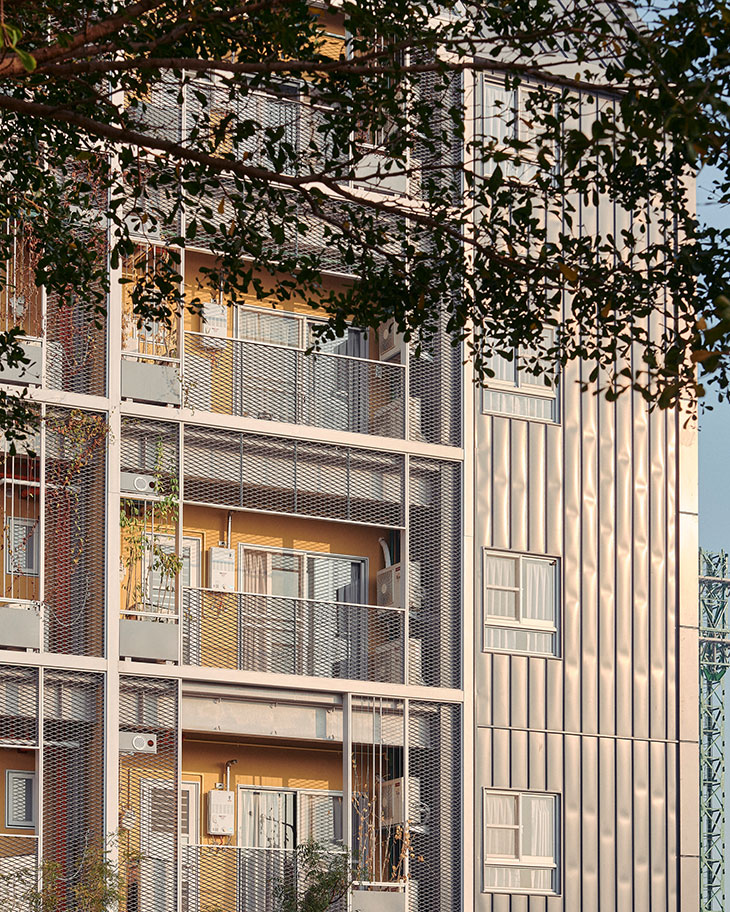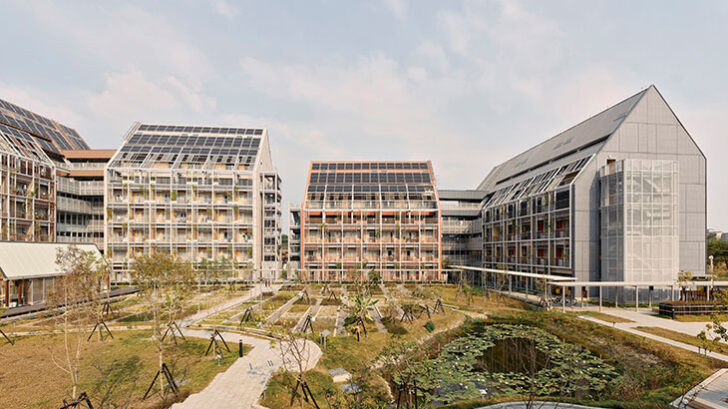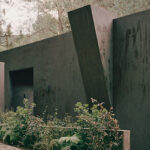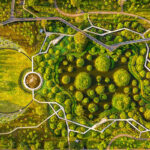
The Taisugar Circular Village (TCV) by BaF, in Tainan City stands as Taiwan’s pioneering residential project fully integrated with the circular economy ideology. Comprising three housing blocks, a Circular Demo House (C-House), and an Eco-House (E-House), TCV accommodates 351 rental units, an urban farm, and an eco-pond situated centrally in the courtyard. This ambitious project exemplifies how modern living can harmonize with sustainable practices, creating a blueprint for future urban developments.

TCV is designed to cater to the collective requirements of contemporary living while reinforcing an intimate sense of community. The residential units serve as private rooms for the inhabitants, the E-House functions as the communal kitchen, and the C-House acts as a shared garden. This design fosters a close-knit community where shared spaces encourage interaction and cooperation among residents, promoting a sense of mutual support.

A core principle of TCV’s design is its focus on adaptability, crucial for circularity. The project emphasizes modularization and a service-oriented appliance supply, integrated within a building passport system for optimized resource management. Modularization is evident in the repetitive balcony façade system of the housing blocks, where prefabricated modules minimize on-site material waste. The external façade, composed of pre-casted modularized panels connected with nuts and bolts, ensures ease of future disassembly. This system not only reduces construction waste but also allows for the reuse and repurpose of materials, extending their life cycles within the value chain.

Every material used in TCV is assigned a unique ID in the material passport, maintaining comprehensive data for each component. This tracking ensures that building materials can continue their life cycles post-demolition. TCV is designed in six layers: foundation, structure, façade, system, partition, and appliances, allowing for isolated repairs without compromising other components. Impressively, TCV’s energy use in 2022 was approximately 50% less than predicted, thanks to its renewable energy systems, underscoring the effectiveness of its sustainable design.

A significant departure from conventional practices is TCV’s service-based approach to appliances. Manufacturers retain ownership of products, facilitating a continuous product life cycle even after disassembly. This innovative model requires close collaboration with suppliers of furniture, elevators, kitchen fixtures, and electronic locks to create sustainable service-based supply contracts. The experimental nature of this procurement model necessitates tailored bank contracts and user agreements, ensuring legal compliance while adhering to circular design principles.
TCV’s commitment to the circular economy not only transforms architectural practices but also cultivates a sustainable framework that fosters community spirit. By integrating residents into a shared local ecosystem, TCV reconnects people with nature and aligns consumption with production. This holistic approach positions TCV as an exemplary model in sustainable architecture, showcasing the potential of circular economy principles to revolutionize residential design.

The firm behind TCV, Bio-architecture Formosana (BaF), is renowned for its expertise in sustainable architecture. BaF’s designs have received numerous accolades, including over 60 EEWH Certifications and more than 20 Intelligent Building Certifications. Their dedication to sustainability is evident in their innovative projects, such as the Taipei Public Library Beitou Branch, the first building in Taiwan to achieve a Diamond Level EEWH Certification. Through TCV, BaF continues to lead the industry towards a more sustainable and circular future in architecture.




